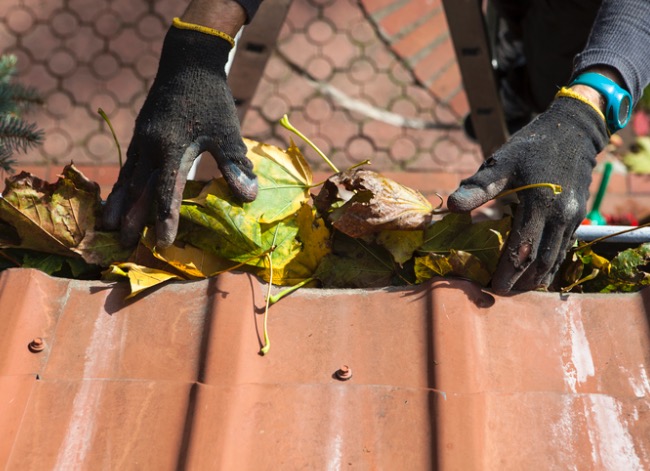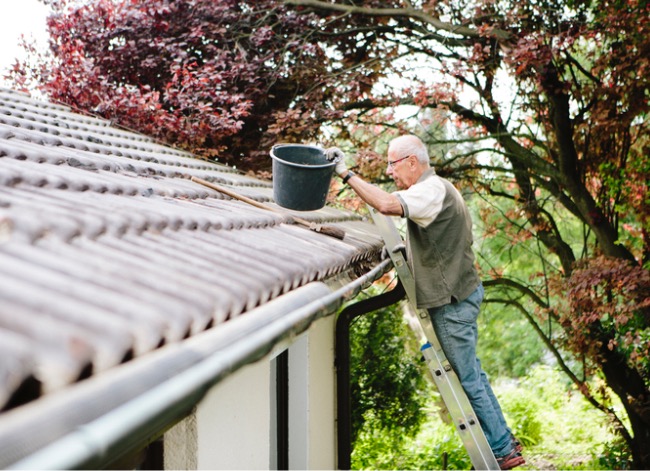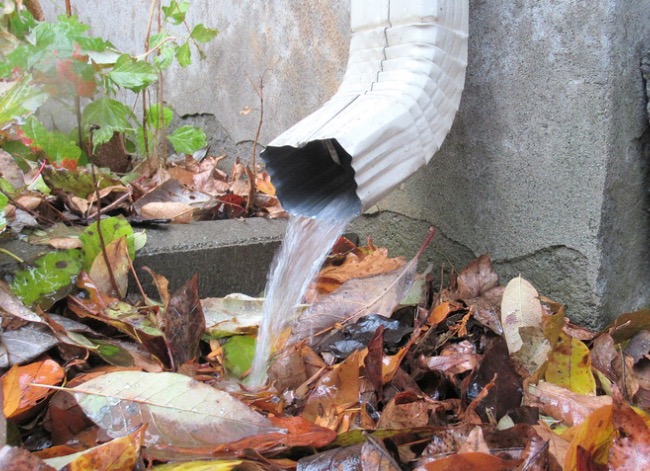We may earn revenue from the products available on this page and participate in affiliate programs. Learn More ›
A home’s gutter system is designed to protect the roof, siding, and foundation from water damage and the accumulation of mold, mildew, and insects that prefer to nest in these damp conditions. However, the horizontal gutter trough is prone to collecting dirt, animal feces, leaves, sticks, and other debris, which can cause the whole system to clog.
A clogged system doesn’t allow water to flow through and it continues to trap additional debris, making the clog worse as more time passes. The rainwater then flows over the edges of the gutter and down the sides of the house, causing lasting damage to the home. By regularly inspecting and cleaning the gutters these clogs can be prevented. It’s important to clean the gutters properly to avoid injuring yourself, and prevent future problems with the gutter system.
DON’T neglect gutter cleaning.
When it rains or snow melts, a gutter channels the water to a designated location on the ground. Ideally, the water flows down and away from the home, though some downspouts are not properly placed, allowing the water to pool around the foundation, which can cause lasting damage. To prevent clogs, it’s necessary to direct the downspout away from the home and clean the gutters at least once per year, as well as after any large storms that could dislodge a significant amount of debris.
If gutters are clogged, rainwater cannot flow through the system. This will cause gutters to overflow and water to run down the walls and siding, pooling around the foundation. This clog also creates a breeding ground for insects and rodents that can make their way inside the home.

DON’T forget to check all safety gear before starting.
To clean the gutters, the minimum requirements for the safety equipment you’ll need include thick work gloves, a long-sleeve shirt, pants, safety glasses, and nonslip boots or shoes. Inspect each piece of equipment for holes, cracks, or any other type of damage before starting. The nonslip footwear helps grip the steps of the ladder, while the safety glasses and gloves protect the user from dirt, insects, animal waste, small rodents, stones, sticks, and other debris.
If you will be working above heights of 10 to 15 feet, then it’s advised to have a safety harness and fall restriction system in place. This is because accidental falls are one of the most common hazards at home and in the workplace with about 39,000 fatal falls countrywide in a calendar year, according to the CDC.
DON’T work without a spotter.
Uneven ladder footing, careless passersby, and sliding ladders all pose a threat to your safety when you are high off the ground, cleaning the gutters. Anytime you are working on a ladder, it’s necessary to have a partner, friend, or even a helpful neighbor standing nearby in order to steady the ladder, control foot traffic in the area, and call for help in an emergency.
While the spotter doesn’t typically need to do a lot, this person does have to pay attention and know what actions to take if the need arises. It isn’t a good idea to give the task to your kid, especially one who is under the age of 16; it’s important the spotter fully understands the potential hazards involved with the job.
DON’T use a ladder that’s unstable or too short.
One of the worst things that you can do while cleaning the gutters is to try and work with a ladder that is ill-suited to the task. Choose a ladder that is long enough to reach the gutters without having to use the top step. Typically, a standard four-legged ladder is a good option that is suitable for a single-story dwelling. However, an extension ladder is necessary for homes that are taller than one story.
Four-legged ladders tend to be more stable than extension ladders, so they are the better choice whenever possible, but if you need the additional height to work safely then it’s advised to use leg levelers and ladder stabilizers to properly support an extension ladder. Leg levelers allow the ladder to adapt to uneven ground, and stabilizers are essentially arms that extend out from the side of the ladder to rest on the roof and provide additional support.

DON’T overreach while on the ladder.
Climb up, climb down, move the ladder, repeat. This process can get tiring after cleaning several sections of gutter, but it’s important that you don’t try to hurry the process along by overreaching to one side or the other. Even with ladder stabilizers and leg levelers, the ladder can twist and slip out from under the user if leaning too much to one side.
The same issue can occur if the ladder isn’t tall enough to properly reach the gutters. Some users may attempt to stand on the second highest step or even the top step in order to stretch up and clean out a hard-to-reach gutter section, but this action puts them at risk of slipping off the top, knocking the ladder over, or simply losing their balance and falling. Always choose an appropriate ladder and take the time to work diligently instead of overreaching.
DON’T be stuck on a ladder without a dump bucket to collect debris.
A small trowel or a gutter cleaning tool makes quick work of accumulated debris, but without a place to collect the dirt, animal feces, leaves, sticks, and other gutter gunk, you may find yourself cleaning it up again from the ground. Make the job significantly easier by bringing a bucket up the ladder with you.
Ideally the ladder will have a paint-can shelf where the bucket can stand or even a hook to hang the bucket, so the debris from the gutters can be shoveled right into the bucket. However, if the ladder cannot hold a bucket, then it may be better to lay a tarp down on the ground where you are working. Simply shovel the gutter gunk down onto the tarp where it can be collected and dumped into a yard bag for disposal.
DON’T forget to clean the downspouts.
When you have cleaned a few gutter sections, it’s normal to fall into a steady rhythm until the entire system is complete, but it’s all too easy to forget about cleaning the downspouts. These sections of the gutter system are integral for funneling water, dirt, and small debris down and out of the troughs to an area away from the foundation of the home.
A clogged downspout will prevent the gutter system from functioning properly and can cause the gutters to become clogged as well. Tapping on the sides of the gutter can loosen light clogs, but dense clogs may need to be cleared with a plumber’s snake. In some circumstances the downspout might have to be disconnected in order to clear a really tough clog, though this can be avoided by regularly cleaning the gutters and checking the entire gutter system.

DON’T forget to flush out the gutters after cleaning them.
While some people suggest using a pressure washer to clean the gutters, this runs the risk of removing tiles from the roof in the process, so in most cases it’s best to avoid this method. However, after cleaning the gutters with a gutter scoop or trowel, a simple garden hose can be used to flush out any remaining dust, dirt, and small debris.
When the hose is directed into the gutter it should rinse off the inside of the trough and act as a quick test to ensure that the gutter system is clear and working correctly. Flushing out the gutters doesn’t just remove excess debris, it also allows you to confirm that the downspout isn’t clogged. You’ll know that the downspout is clear if you follow the flow of the water through to the downspout outlet (or have a or have a helper inspect the downspout, if you’re still on a ladder) to make sure that the water is coming out without an issue.


